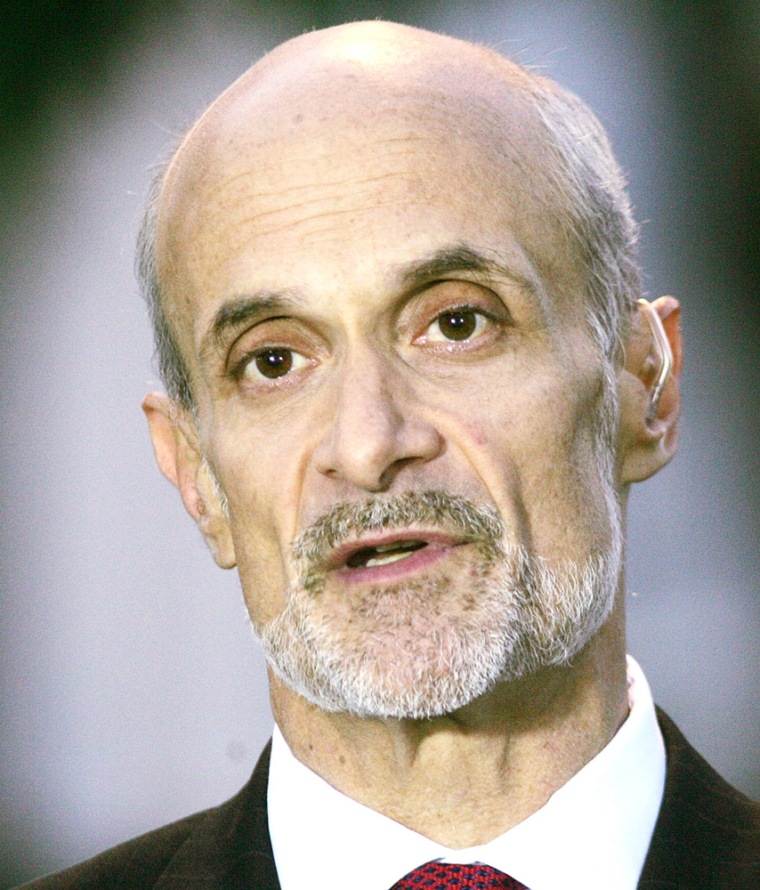Michael Chertoff survived the fallout over the federal response to Hurricane Katrina, which cost President Bush political capital and the government’s emergency chief his job.
The next storm, Hurricane Rita, looms as a test for the Homeland Security secretary with little margin for error and few others to take the blame.
Chertoff, a brusque former prosecutor, has maintained a tight grip on his job heading the department, which oversees 22 disparate agencies, including the lead entity for natural disasters, the Federal Emergency Management Agency.
He has faced some carping from Democrats, but nothing on the scale of criticism leveled at Bush or former FEMA Director Michael Brown for the government’s slow-motion reaction to Katrina.
“He gets a bye because he’s so new,” said Paul C. Light, a New York University professor who recently completed a study of the Homeland Security Department.
Yet, Chertoff, on the job since February, has made some of the same missteps as Brown.
Made same mistakes as ex-FEMA director
Like Brown, Chertoff was unaware of thousands of desperate people stranded in the convention center in New Orleans, pleading for food, water and an escape from the squalor. Despite widespread news reports from the center, he dismissed them as rumor.
The day after the hurricane hit the Gulf Coast, as the waters of Lake Pontchartrain overwhelmed the levees and flooded the city, Chertoff spent a few hours in Atlanta, attending a conference on the potential threat of the avian flu.
He is working to ensure the response to Rita is different. In a round of morning talk show interviews Wednesday, Chertoff stressed the importance of early evacuations and cooperation with state and local officials.
He spoke of a government prepared. “I think we’re going to be ready when it does hit land,” Chertoff told CBS’ “The Early Show.”
So far, a confluence of Washington realities and public perceptions has helped Chertoff avoid the brunt of the blame for Katrina and hold onto his Cabinet post.
‘Collapse of modern government’
“This was such a stunning collapse of modern government that people understand that it’s really not about personality,” said former House Speaker Newt Gingrich, R-Ga.
Among the realities and perceptions:
- Brown was the face of FEMA, the agency most closely associated with answering natural disasters. Chertoff, a former assistant attorney general in the Bush Justice Department, still carries the image of the law enforcement and terrorism expert.
- Early on in the crisis, the Bush administration pushed Brown to the forefront and he became the personification of the government’s response.
“They threw over to the wolves the most expendable member,” said Gary L. Wamsley, a public administration specialist at the Virginia Polytechnic Institute and State University.
It was Chertoff’s decision to dispatch Brown back to Washington — a call he cleared first with Bush — and away from on-the-ground Katrina duty. Brown resigned as FEMA director three days after his ignominious fall. - Chertoff was Bush’s second choice for the job after the fumbled nomination of Bernard Kerik. The 51-year-old lawyer gave up a lifetime appointment to a U.S. Appeals Court to take a job with an administration that is loath to fire loyal employees, even those who make high-profile mistakes.
“I can’t think of anyone who has been significantly sanctioned for their bad performance,” said former Sen. Bob Graham, D-Fla. “A guy like George Tenet played a major role” as CIA chief in intelligence gathering on the Sept. 11 attacks and weapons of mass destruction in Iraq, and “he gets the National Medal of Honor.” - Chertoff has been pushing for a major reorganization of the department, including the creation of a separate preparedness operation that would allow FEMA to focus on response and recovery.
Light said Chertoff’s reforms would have taken FEMA back to its original missions. Now, “he is probably the only person in town who could say I told you so,” the professor said. - With Brown out, there is little appetite for another scapegoat.
“I think that Mike Brown is gone, Michael Chertoff is doing the job and leave it at that,” said Rep. Peter King, R-N.Y., the new chairman of the House Homeland Security Committee. - Bush’s statement that he took responsibility for any failures of the federal government lessened the heat on others in his administration.
“The White House, to a degree, blunted all that by having the president come forward,” said Scott Sobel, a crisis communications expert.
Concentrated too much on avian flu?
Chertoff has faced some criticism about his response to the devastation in the Gulf Coast states, including his trip to the Centers for Disease Control and Prevention in Atlanta for the conference on the avian flu.
Russ Knocke, a spokesman for the department, said the secretary has expressed concern about the potential for a pandemic from the disease. Chertoff spent about two hours at the conference and traveled to the FEMA Regional Coordination Center nearby to assess the response to the hurricane, Knocke added.
Still, some victims of the disaster wondered why Chertoff hasn’t been held accountable.
“You got me. You got me,” said Rep. Gene Taylor, D-Miss., whose Bay St. Louis home was destroyed along with much of his district.
Desperate to get food and water to his district, the congressman said he contacted FEMA and the Homeland Security Department but repeatedly was told, “it’s in the pipeline” by “third and fourth-string” employees.
